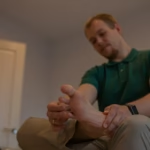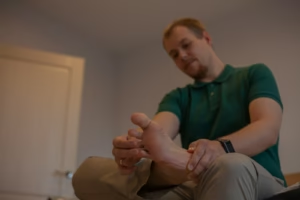Why Your Feet Are Trying to Tell You Something
Almost 20 Million Americans are dealing with peripheral neuropathy – a problem that generally starts out as a weird sensation: a sort of tingling in the feet and toes. That pins-and-needles feeling you’ve been trying to brush off? Well – it’s probably your body’s way of telling you that something is amiss.
For most people, a foot tingle is simply put down to sitting for too long or wearing shoes that are a bit too tight. But the truth is, persistent tingling usually hints at a deeper issue. Here we take a closer look at the real reasons behind that annoying sensation, when you should start to get worried, and what you can actually do about it.
We’ll take you through the actual causes of that foot tingling – from nerve compression right on down to metabolic disorders. Along the way you’ll learn how to spot the warning signs, what treatments really work, and most importantly how to keep your nerve health in check for the long haul.
What’s Really Happening When Tingling in Feet Strikes
Tingling happens when nerves get squished, messed up, or just plain irritated. You can think of your nervous system as a network of electrical wires. Imagine if a wire got pinched or started to fray – suddenly the signals get all mixed up.
Your feet are basically teeming with nerve endings – thousands of ’em. These nerves are constantly burbling away to the brain with the latest on temperature, pressure and how much hurt your feeling. But if something gets in the way and messes up this constant chatter, it can leave you with tingling, numbness or this burning sensation.
There’s a bunch of underlying conditions that can trigger these symptoms. Right at the top of the list is diabetes – high blood sugar levels can mess with nerve function big time. Not getting enough of that vital vitamin B12, on the other hand, can leave your nerves starved for the goodies they need to work properly. And then there’s tarsal tunnel syndrome – basically carpal tunnel for your ankle. This one compresses the nerves that run in your ankle.
Peripheral artery disease reduces blood flow to the extremities, less blood means less oxygen for those nerve cells. Herniated discs in your lower back can even pinch nerves that run all the way down to the feet. And then there are some medications out there that just plain old cause tingling as a side effect.
A particularly interesting case from Massachusetts General Hospital involved a patient who was getting progressive tingling for months. Docs initially thought it was probably diabetes but then they ran some tests and found out the patient had a severe vitamin B12 deficiency caused by an autoimmune condition. After some targeted vitamin B12 supplements, the symptoms went away in just a few weeks. That’s a good reminder why getting the right diagnosis is way more important than just making up your mind.
The pattern and timing of your tingling can be a real clue to what’s going on. Does it happen when you’re active or when you’re just sitting around? Does it affect one foot or both? All these details can help healthcare providers narrow down what might be going on.
Recognizing the Warning Signs That Demand Attention
Understanding when that tingling gets serious is key to avoiding nasty complications. Some symptoms demand a doctors visit right away, others can wait a few days.
Pay some mind to how your tingling shows up – where it happens, how often its happens, and what comes along for the ride can say a whole lot.
Don’t wait to see the doctor if you notice any of these:
- Severe tingling hits out of the blue and is paired with weakness – get that sorted out pronto
- You lose bladder or bowel control and it’s linked to tingling in your feet – that needs to be checked out ASAP
- You hurt your back and now you’ve got tingling going on – don’t mess around
- One or both of your feet go completely numb – not nice, get to the docs
- You’re having trouble walking or staying on your feet – not good
- Tingling’s accompanied by a nasty case of chest pains or breathing troubles – get to the ER
Get an appointment set up with your doc asap when you notice:
- Tingling’s been going on for longer than a few days, no matter how small it is
- Your symptoms keep getting worse and worse over time
- Pain is such a problem that it’s stopping you from getting on with the daily stuff
- There are visible changes going on in the colour or temperature of your feet
- Tingling starts in your feet but before long its spread upwards
- Your quality of life is being impacted by your symptoms
And your medical history actually is a big player too. If youve got diabetes you need to report any new tingling as soon as possible. And if you’re on chemo, you need to get in to see the doc about nerve damage – its a thing.
We at Physio Whisper make a big point about getting on top of this early. The thing is, the more time passes the harder it is to reverse nerve damage and get things sorted. Catching stuff early on is often the best way to make sure you get a good outcome and avoid complicated treatments.
And one last thing dont just write off tingling as “oh i’m just getting older” yeah thats a thing that happens gradually but sudden or rapidly changing symptoms are a red flag no matter how old you are.
Effective Strategies to Relieve Tingling in Feet
Treatment has got to get to the bottom of whats going on. You can’t treat nerve problems without first figuring out whats causing them – trying to fit a square peg into a round hole just doesn’t work.
Your doctor will start off by running some diagnostic tests, but what they’re really trying to do is rule out some of the more obvious causes of nerve symptoms like diabetes, a vitamin deficiency or an underactive thyroid.
They might do some blood work to check all of these things. Then they’ll probably do some nerve conduction studies to see how well your nerves are actually working. And if they think you might have a structural problem like a herniated disc or a tumour, they’ll probably order an imaging scan to take a closer look.
Once you’ve got a diagnosis, treatment can finally start getting targeted and effective. And often, once you get the underlying problem under control, the tingling goes away completely.
Medical treatments you might encounter:
- Getting your blood sugar under control through diet, exercise and medication if you have diabetes – and diabetic neuropathy is a real possibility
- Taking vitamins to top up any deficiencies that might be causing damage to your nerves
- Doing some physical therapy to get your mobility up and take some pressure off your nerves
- Taking some medication specifically for nerve pain – gabapentin or pregabalin are two that are often prescribed
- Getting a corticosteroid injection to cut down on the inflammation that might be causing your nerves to get compressed
- Surgery for more serious cases of nerve entrapment
Home management strategies can really make a difference:
- Just taking a close look at your feet regularly to catch any problems early on
- Wearing shoes that fit properly and don’t squish your feet – it makes a big difference when it comes to nerve compression
- Soaking your feet in warm water to get the circulation going and make things a bit more comfortable
- Doing some gentle stretching to take the pressure off your nerves
- Lifting your feet up to get the blood flowing again and prevent swelling
- Swearing off booze and cigs – they can make nerve damage worse
- Keeping yourself at a healthy weight to take the pressure off your lower extremities
Physical therapy plays a big part in getting better. Strengthening your muscles, improving your balance and taking the pressure off your nerves is all part of it. And its all about releasing the tight tissues that are putting pressure on your nerves – the therapist will do this with manual therapy techniques.
Consistency is key here – rather than trying to do one big exercise session a week, just do a bit every day and it will add up over time. Twenty minutes a day is better than one marathon session a week.
Some people swear by alternative treatments like acupuncture or TENS – even though the research is a bit mixed, some people do really benefit from these things. Just be sure to have a word with your doctor first.
What Science Reveals About Nerve Health
New research has really started to flip our understanding of peripheral neuropathy on its head. What those studies show is that getting in on it early with treatment can make a world of difference – a lot more difference than if you wait until it’s too late to do anything about it.
We got a pretty eye-opening review in the Journal of the American Medical Association recently that found controlling blood sugar levels can cut your risk of getting diabetic neuropathy by a pretty significant 60 percent. That really drives the point home on the importance of preventative care over just treating the symptoms as they come up.
There was a study done at Johns Hopkins University that found out an astonishing 15 percent of people over 60 have a vitamin B12 deficiency. The problem is that the symptoms can come on so gradually that people often go years without even realizing they’re suffering from it. But it’s super easy to diagnose by just running some blood work – and the good news is that it’s a reversible cause of all that tingling.
The National Institute of Neurological Disorders and Stroke confirms that peripheral neuropathy can be caused by over 100 different conditions – which is why it’s absolutely crucial to get a personalized diagnosis. What works for one person is often a total dead-end for another.
Truth is though, we’re starting to see some real breakthroughs in treatment too. Researchers are looking into these growth factors that could potentially even help regrow nerve tissue, and there are new medications that are showing promise in protecting nerves from further damage. Maybe most promising of all is that these new treatments are starting to give people hope for conditions that were once thought to be completely untreatable.
Building Habits That Keep Nerves Healthy
Prevention beats treatment every time. Protecting your nerves requires daily choices not lifestyle overhauls.
Start with nutrition. Nerves need B vitamins especially B12, B6 and folate. Include lean proteins, leafy greens, whole grains and fortified cereals in your diet. If you are vegetarian or vegan supplementation becomes even more important.
Regular exercise improves circulation and blood sugar regulation. You don’t need intense exercise. Thirty minutes of walking a day is beneficial. Swimming and cycling are low impact and good for your joints and cardiovascular system.
Manage chronic conditions proactively. If you have diabetes monitor your blood sugar levels regularly. Follow your treatment plan for thyroid disorders, autoimmune conditions or other systemic diseases. Uncontrolled chronic illness accelerates nerve damage.
Protect your feet from injury. Wear the right shoes for the activity. Check your feet daily especially if you have reduced sensation. Small cuts or blisters can become big problems when nerves don’t signal pain.
Limit exposure to toxins. Excessive alcohol damages peripheral nerves directly. Certain industrial chemicals and heavy metals can cause nerve damage. Use protective equipment when working with hazardous substances.
Stay up to date with medical checkups. Regular screenings catch problems before symptoms appear. Annual physicals should include neurological assessments especially if you have risk factors for nerve damage.
Stress management helps nerve health too. Chronic stress triggers inflammation throughout your body including your nervous system. Practice what works for you whether it’s meditation, yoga or simple deep breathing exercises.
Taking the Next Step Toward Healthy Feet
Tingling in feet isn’t something to be dismissed. We’ve looked at the common and not so common causes of those pesky feelings from diabetes and vitamin deficiencies to nerve compression and circulation problems.
You know how to spot the warning signs that need immediate attention versus symptoms that can wait. Knowing the difference empowers you to act when tingling strikes.
We’ve covered treatments that address the root cause not just the symptoms. Medical interventions, physical therapy and lifestyle changes work together to get nerve function back and get rid of the discomfort.
Science says early intervention is key. Research shows that addressing nerve problems early on produces better outcomes than waiting. Prevention through healthy habits protects your nerves long before problems arise.
Your feet carry you through life. They deserve attention when they’re screaming for help. Persistent tingling isn’t something to ignore or accept as part of life.
Professional guidance makes all the difference between temporary relief and lasting resolution. Whether your symptoms just started or you’ve had them for months, expert evaluation will find the real cause and map out the way forward.
Head to Physio Whisper for more on nerve health, mobility and body signals. Have you had unexplained tingling in your feet and what worked for you?
References
- National Institute of Neurological Disorders and Stroke – Peripheral Neuropathy Fact Sheet: https://www.ninds.nih.gov/health-information/disorders/peripheral-neuropathy
- Journal of the American Medical Association – Diabetic Neuropathy Prevention: https://jamanetwork.com/
- Johns Hopkins Medicine – Vitamin B12 Deficiency: https://www.hopkinsmedicine.org/
- American Diabetes Association – Neuropathy Guidelines: https://diabetes.org/
- Mayo Clinic – Peripheral Neuropathy Symptoms and Causes: https://www.mayoclinic.org/diseases-conditions/peripheral-neuropathy














